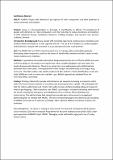| dc.contributor.author | Casey, Dympna | |
| dc.contributor.author | Kouroupetroglou, Christos | |
| dc.contributor.author | Koumpis, Adamantios | |
| dc.contributor.author | Murphy, Kathy | |
| dc.date.accessioned | 2016-06-20T10:28:15Z | |
| dc.date.available | 2016-06-20T10:28:15Z | |
| dc.date.issued | 2015 | |
| dc.identifier.citation | Casey, D., Kouroupetroglou, C., Koumpis, A. and Murphy, K. (2015) The perceptions of people with dementia on robot companions and their potential to reduce loneliness and isolation. Paper presented at the: 25th Alzheimer Europe Conference Dementia: Putting strategies and research into practice., Ljubljana, Slovenia. | en_IE |
| dc.identifier.uri | http://hdl.handle.net/10379/5886 | |
| dc.description.abstract | Introduction & background: Many people with dementia experience social exclusion, loneliness and isolation which contribute to further cognitive decline. The use of ICT solutions to combat isolation and loneliness in people with dementia to act as companions show much promise.
Aim: The MARIO Horizon 2020 research project aims to manage active and healthy ageing by developing robot companions based on the needs of people with dementia and their carers to help reduce isolation and loneliness.
Methods: A qualitative interpretive descriptive design based on the work of Thorne (2004) was used in the first phase of this study to investigate how robots could be designed that best meets the needs of people with dementia. Three focus group interviews with people with mild/moderate dementia were undertaken. Participants were either living in the community or residing in long term care. Thematic analysis was used to analyse the data and the criteria identified by Lincoln and Guba (1985) was used to ensure and maintain rigor. Ethical approval was obtained from the University ethics committee.
Findings: Findings indicate that people with dementia are receptive to having a companion robot within the home, but less inclined to have the robot accompany them in public. All participants felt that the robot could prompt and remind them with various activities including eating, drinking and when to go shopping. Others functions that MARIO could support included orientating them around the house; cooking and baking and reminding them of social events, family birthdays and anniversaries. The ability to have face recognition was also seen as key as well as engaging in preferred games or hobbies with MARIO. This work reveals that people with dementia are accepting of MARIO and could see its potential in helping retain cognitive abilities and reduce isolation and loneliness. | en_IE |
| dc.description.sponsorship | European Union Horizons 2020- the Framework Programme for Reaserch and Innovation (2014-2020) under
grant agreement 643808 Project MARIO | en_IE |
| dc.format | application/pdf | en_IE |
| dc.language.iso | en | en_IE |
| dc.relation.ispartof | 25th Alzheimer Europe Conference Dementia: Putting strategies and research into practice | en |
| dc.rights | Attribution-NonCommercial-NoDerivs 3.0 Ireland | |
| dc.rights.uri | https://creativecommons.org/licenses/by-nc-nd/3.0/ie/ | |
| dc.subject | Dementia | en_IE |
| dc.subject | Robot companions | en_IE |
| dc.subject | Loneliness | en_IE |
| dc.subject | Isolation | en_IE |
| dc.subject | Nursing and Midwifery | en_IE |
| dc.title | The perceptions of people with dementia on robot companions and their potential to reduce loneliness and isolation | en_IE |
| dc.type | Conference Paper | en_IE |
| dc.date.updated | 2016-06-14T15:16:36Z | |
| dc.identifier.doi | http://www.alzheimer-europe.org/Conferences/Previous-conferences/2015-Ljubljana/Detailed-programme-abstracts-and-presentations | |
| dc.identifier.doi | 10.13025/S8301S | |
| dc.local.publishedsource | http://doi.org/10.13025/S8301S | |
| dc.description.peer-reviewed | peer-reviewed | |
| dc.contributor.funder | Horizon 2020 | |
| dc.internal.rssid | 11094679 | |
| dc.local.contact | Dympna Casey, School Of Nursing & Midwifery, Aras Moyola, Nui Galway, Galway. 3652 Email: dympna.casey@nuigalway.ie | |
| dc.local.copyrightchecked | No | |
| dcterms.project | info:eu-repo/grantAgreement/EC/H2020::RIA/643808/EU/Managing active and healthy aging with use of caring service robots/MARIO | |
| nui.item.downloads | 198 | |


